新目标八年级上册英语Unit1Section A 1 (1a-2d)表格教案
- 格式:docx
- 大小:23.56 KB
- 文档页数:3
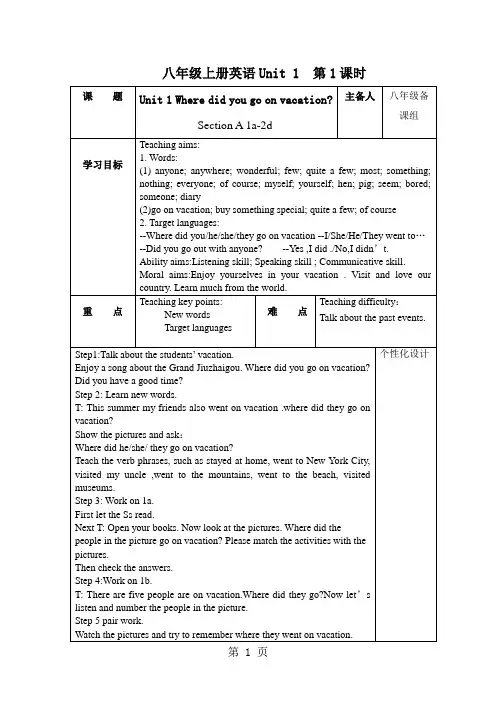
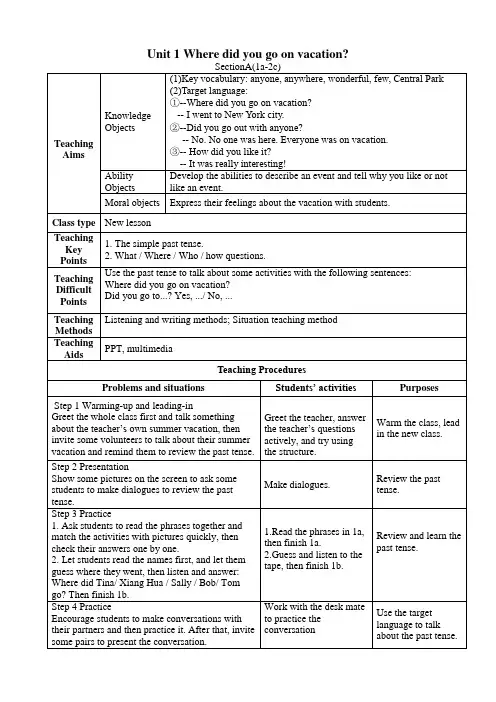
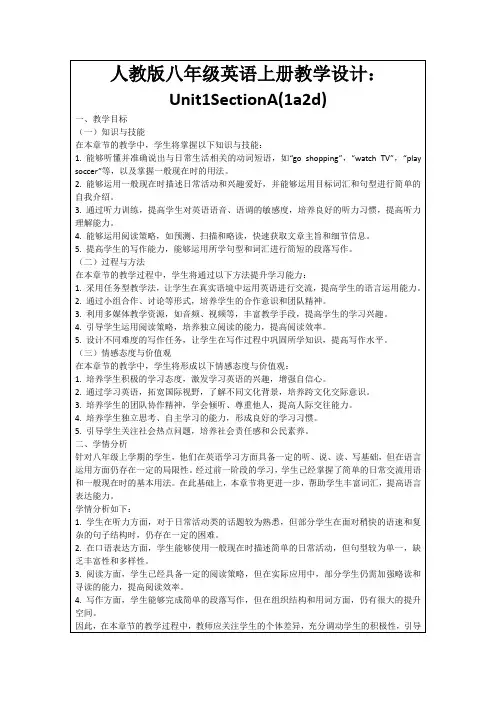
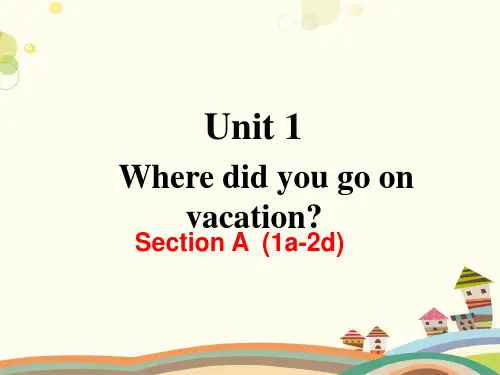
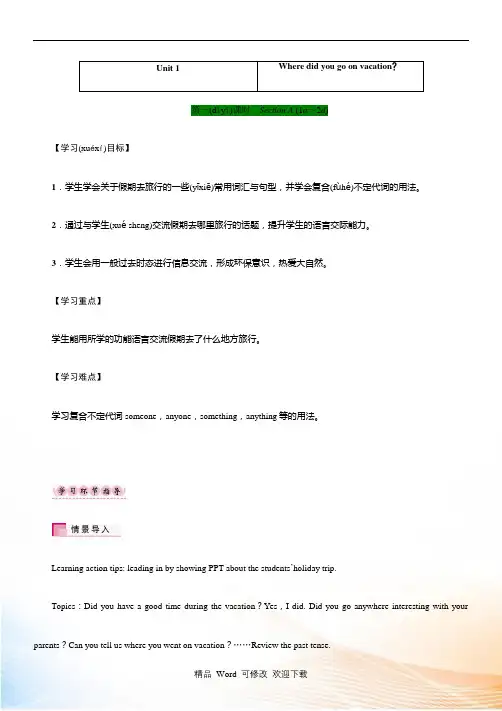
Unit 1 Where did you go on vacation?第一(dìyī)课时Section A (1a~2d)【学习(xuéxí)目标】1.学生学会关于假期去旅行的一些(yīxiē)常用词汇与句型,并学会复合(fùhé)不定代词的用法。
2.通过与学生(xué sheng)交流假期去哪里旅行的话题,提升学生的语言交际能力。
3.学生会用一般过去时态进行信息交流,形成环保意识,热爱大自然。
【学习重点】学生能用所学的功能语言交流假期去了什么地方旅行。
【学习难点】学习复合不定代词someone,anyone,something,anything等的用法。
Learning action tips: leading in by showing PPT about the students’holiday trip.Topics:Did you have a good time during the vacation?Yes,I did. Did you go anywhere interesting with your parents?Can you tell us where you went on vacation?……Review the past tense.Task 1Learning action tips: Preview the words on Page2 in the word list. Students read the words by phonetic symbols, then underline new words in the text and mark the Chinese meaning. At last finish the task in 1a.【知识(zhī shi)链接】1.复合不定(bùdìng)代词有:某人(mǒu rén)someone任何人anyone没有(méi yǒu)人no one每个人everyone某事something任何(rènhé)事anything没有东西nothing一切everything2.anyone与any one的区别anyone通常指人,侧重于个体,后面不带of;any one既指人,又指物,侧重于整体,后面可接of。
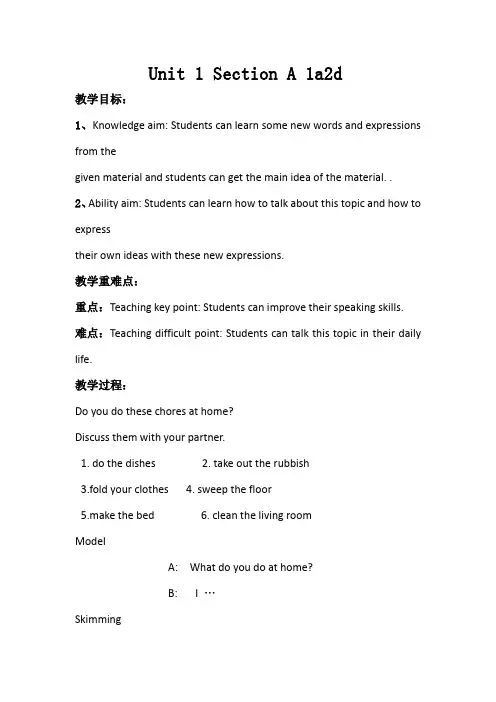
Unit 1 Section A 1a2d教学目标:1、Knowledge aim: Students can learn some new words and expressions from thegiven material and students can get the main idea of the material. .2、Ability aim: Students can learn how to talk about this topic and how to expresstheir own ideas with these new expressions.教学重难点:重点:Teaching key point: Students can improve their speaking skills.难点:Teaching difficult point: Students can talk this topic in their daily life.教学过程:Do you do these chores at home?Discuss them with your partner.1. do the dishes2. take out the rubbish3.fold your clothes4. sweep the floor5.make the bed6. clean the living roomModelA: What do you do at home?B: I …SkimmingThis means looking quickly through a piece of writing to find the main idea without reading every word. It is still a good idea to read the first sentence in each paragraph a little more carefully.They are probably about whether kids should________.A. spend time on schoolworkB. help out with chores at homeC. learn to be independent(独立的)Dear Sir,I do not understand why some parents make their kids help with housework and chores at home. Kids these days already have enough stress from school.They do not have time to study and do housework, too. Housework is a waste of their time. Could we just let them do their job as students? They should spend their time on schoolwork in order to get good grades and get into a good university. Also, when they get older, they will have to do housework so there is no need for them to doit now. It is the parents’job to provide a clean and fortable environment at home for their children. And anyway, I think doing chores is not so difficult. I do not mind doing them.Ms. MillerDear Sir,I think it is important for children to learn how to do chores and helptheir parents with housework. It is not enough to just get good grades at school. Children these days depend on their parents too much. They are always asking, “Could you get this for me?”or “Could you help me with that?”Doing chores helps to develop children's independence and teaches them how to look after themselves. Italso helps them to understand the idea of fairness. Since they live in one house with their parents, they should know that everyone should do their part in keeping it clean and tidy. Our neighbors’son got into a good college but during his first year, he had no idea how to take care of himself. As a result, he often fell ill and his grades dropped. The earlier kids learn to be independent, the better it is for their future.Mr. SmithMake conversations between Peter and his father.Ask for permission礼貌地取得同意A: Could I use your puter?B: Sorry. I'm going to work on it now.A: Well, could I watch TV?B: Yes, you can, but first you have to clean your room.homework.Help your parents do housework..Make a new conversation about housework.DiscussionQ1: Do you help your parents do the chores at home?Q2: Do you ask your parents’permission for?Q3: Do your parents ask you to do some things for them? What do your parents ask you to do?study harddo choresgo to the store/supermarket to buy things for them。
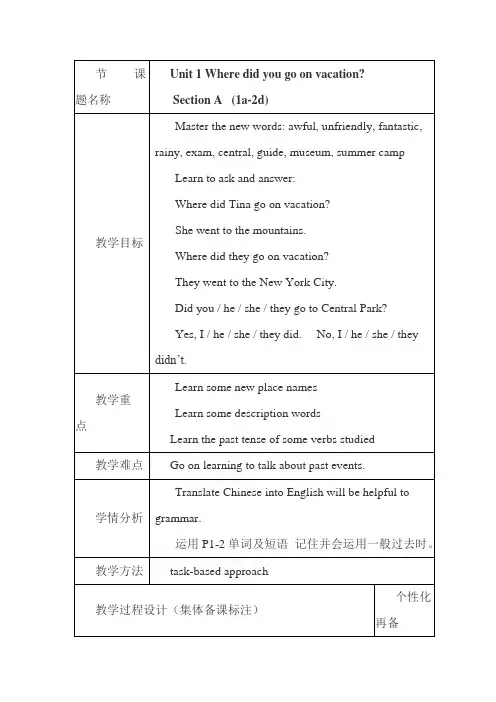
Unit 1 Where did you go on vacation?Section A (1a-2d)Step 1: Warming upActivity 1List some verbs on the blackboard. Ask students to change the words into the past forms together. Read the past forms loud.visited, went, studied, had, did, practiced,Activity 2Go on asking what you/he/she/did last weekend using the verbs they learned. Focus attention on the form of verbs.Step 2: PresentingLet students say out the verbs learnt before and help them say as many as possible. Repeat the new language points. Ask students: Did you stay at home yesterday?Did you stay at school last weekend?Where did you go on vacation?Where did your parents go on vacation?Step 3: PracticingActivity 1work in pairs. Ask and answer about where their parents, 承接七下最后一个单元的内容,继续谈论过去时。
结合刚刚过去的暑假,可以将语言学习和生活很好的结合起来。
先在课堂上畅所欲言,然后课后以布置作文的形式将所言所感写下来。
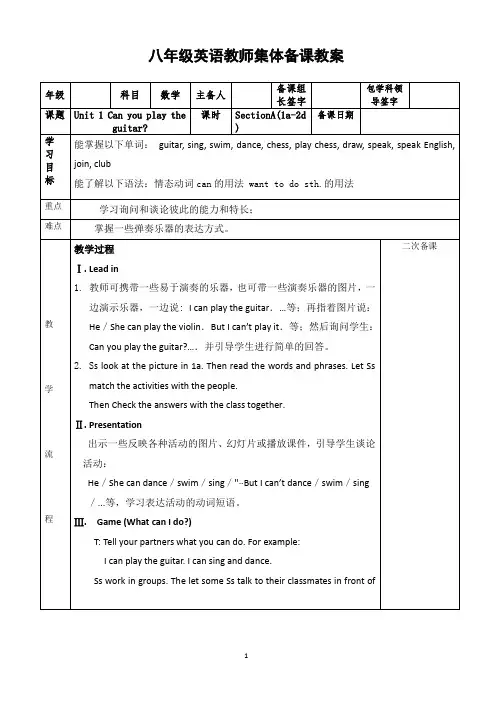
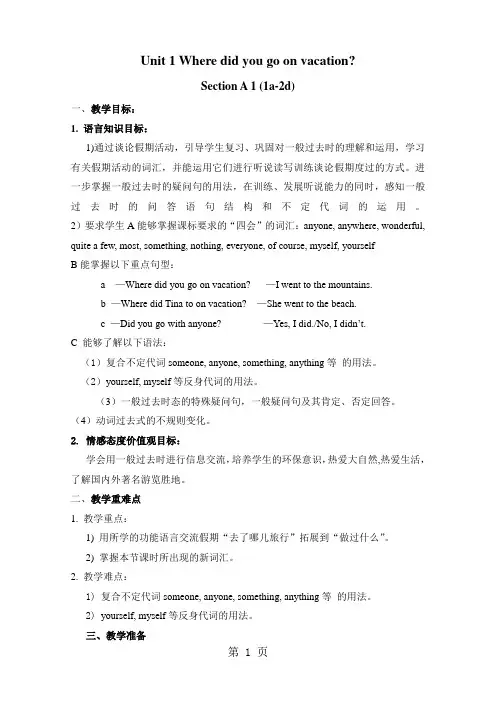
Unit 1 Where did you go on vacation?Section A 1 (1a-2d)一、教学目标:1. 语言知识目标:1)通过谈论假期活动,引导学生复习、巩固对一般过去时的理解和运用,学习有关假期活动的词汇,并能运用它们进行听说读写训练谈论假期度过的方式。
进一步掌握一般过去时的疑问句的用法,在训练、发展听说能力的同时,感知一般过去时的问答语句结构和不定代词的运用。
2)要求学生A能够掌握课标要求的“四会”的词汇:anyone, anywhere, wonderful, quite a few, most, something, nothing, everyone, of course, myself, yourselfB能掌握以下重点句型:a —Where did you go on vacation? —I went to the mountains.b —Where did Tina to on vacation? —She went to the beach.c —Did you go with anyone? —Yes, I did./No, I didn’t.C 能够了解以下语法:(1)复合不定代词someone, anyone, something, anything等的用法。
(2)yourself, myself等反身代词的用法。
(3)一般过去时态的特殊疑问句,一般疑问句及其肯定、否定回答。
(4)动词过去式的不规则变化。
2. 情感态度价值观目标:学会用一般过去时进行信息交流,培养学生的环保意识,热爱大自然,热爱生活,了解国内外著名游览胜地。
二、教学重难点1. 教学重点:1) 用所学的功能语言交流假期“去了哪儿旅行”拓展到“做过什么”。
2) 掌握本节课时所出现的新词汇。
2. 教学难点:1) 复合不定代词someone, anyone, something, anything等的用法。
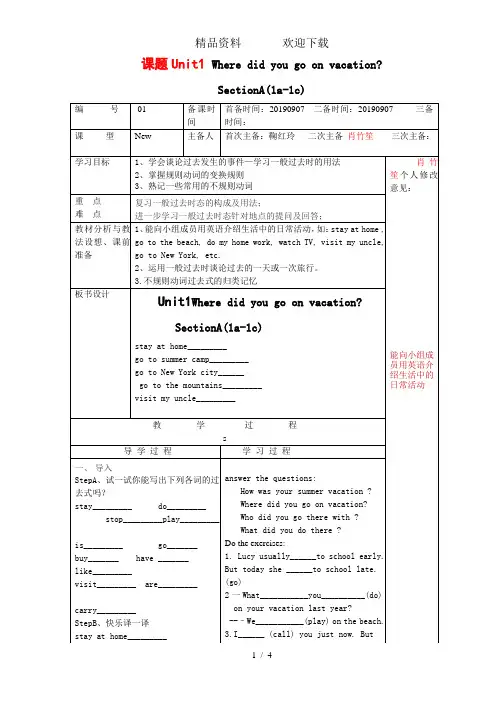
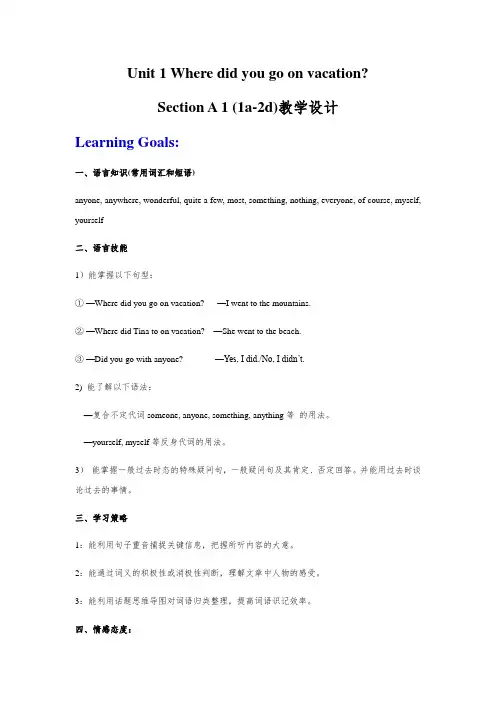
Unit 1 Where did you go on vacation?Section A 1 (1a-2d)教学设计Learning Goals:一、语言知识(常用词汇和短语)anyone, anywhere, wonderful, quite a few, most, something, nothing, everyone, of course, myself, yourself二、语言技能1)能掌握以下句型:①—Where did you go on vacation? —I went to the mountains.②—Where did Tina to on vacation? —She went to the beach.③—Did you go with anyone? —Yes, I did./No, I didn’t.2) 能了解以下语法:—复合不定代词someone, anyone, something, anything等的用法。
—yourself, myself等反身代词的用法。
3)能掌握一般过去时态的特殊疑问句,一般疑问句及其肯定、否定回答。
并能用过去时谈论过去的事情。
三、学习策略1:能利用句子重音捕捉关键信息,把握所听内容的大意。
2:能通过词义的积极性或消极性判断,理解文章中人物的感受。
3:能利用话题思维导图对词语归类整理,提高词语识记效率。
四、情感态度:学会用一般过去时进行信息交流,培养学生的环保意识,热爱大自然。
五、文化意识了解国内外著名游览胜地,如:黄果树瀑布,中央公园等。
【设计意图】目标引领,表述了本节课的知识、能力、学习策略、情感态度和文化意识。
Teaching and learning stepsStep1. Preview(教师寄语: No pains, no gains.没有付出就没有收获。
)Read from P1 to P3 and put the Chinese into English orally, then write them down without looking at your book..P1: 翻译下列短语1: 去海滩________________ 2:去爬山_______________3:待在家里____________ 4:拜访/看望…老师________5:去度假_______________ 6:参观博物馆_____________7:去参加夏令营___________P2:翻译下列句子1.好久不见。
人教版初中英语八年级上册Unit 1 Where did you go on vacation?Section A 1 (1a-2d)教学设计Unit1 Section A (1a-2d) 练习一、单项选择题(共5题,共50分)1. (10分)—How was your day off?—Pretty good! I ______ the science museum with my schoolmates.A. visitedB. visitC. am visitingD. will visit2. (10分)—How was your trip to Shanghai, Jim?—Great! We _______ to Xixi National Wetland Park.A. goB. am goingC. wentD. will go3. (10分)—Did your father work in America in 1999?—_______. He worked in China.A. No, he doesn'tB. Yes, he doesC. No, he didn'tD. Yes, he did4. (10分)—July, is it OK to leave you at home by _______?—Of course, dad.A. myselfB. yourselfC. herselfD. yourselves5. (10分)I'd like to go _______.A. to peaceful somewhereB. to somewhere peacefulC. somewhere peacefulD. peaceful somewhere二、句型转换(共5题,共50分)6. (10分)—Did you clean the hallway? (作肯定回答) —Yes, _______ _______.7. (10分)Lily visited her aunt last week. (改为否定句) Lily _______ _______ her aunt last week.8. (10分)I saw an interesting show last night. (改为一般疑问句) _______ you _______ an interesting show last night?_______ _______ they _______ in the room?_______ _______ the ship trip?。
Unit 1 Where did you go on vocation?第一课时Section A(1a-2d)【Free talk】What did you do on your summer vocation?【学习目标】1.能掌握下列单词和短语:anyone, anywhere, wonderful, few, most, quite a few, stayat home, go to the beach, summer camp, visit museums, buy anything special, meetanyone interesting, study for tests, buy anything special,quite a few,takephotos.2.重点掌握以下句型:1)—Where did you go on vacation? —I went to New York City.2)—Did you go out with anyone? —Yes, I went with my mother.3)Long time no see.3.学会谈论过去发生的事件——学习一般过去式的用法。
4.学会谈论节假日的活动。
【导学案】一、阅读课本第1页-第2页,独立翻译下面的短语:1.在度假2.去爬山 _____3.呆在家里 __________________4.go to the beach ______________5.参观博物馆 ______________6.参加夏令营 ________________7.buy something special ________________ 8.遇见某些有趣的人 __________二、试着写出下列句子,体会一般过去式的用法。
1.假期你去了哪里?我去了爬山了。
___________________________________2.我参加了夏令营。